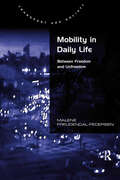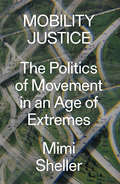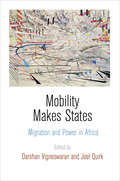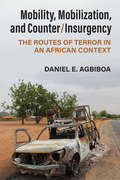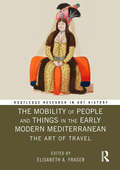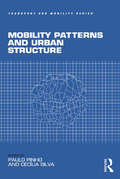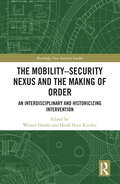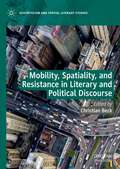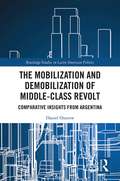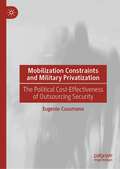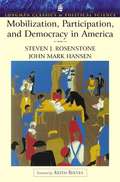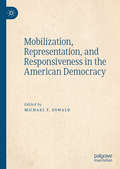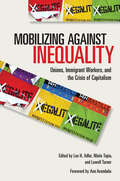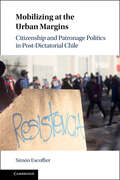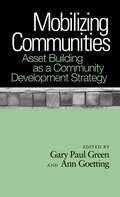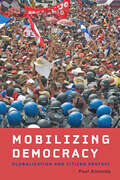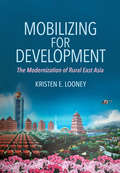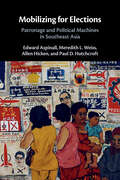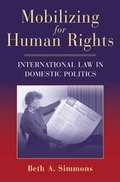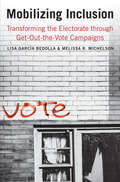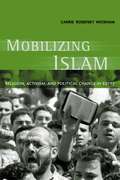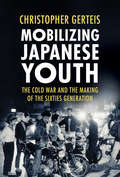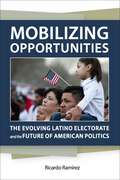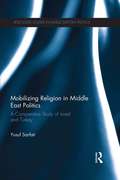- Table View
- List View
Mobility in Daily Life: Between Freedom and Unfreedom
by Malene Freudendal-PedersenWhy do we choose specific modes of transport and what are the perceived rationalities for our choice? How are different theoretical concepts within mobility research actually perceived and lived in everyday life? At this book's core is a conceptual and empirical contribution to critical mobility research. It focuses on the tension between freedom and unfreedom, articulated through the dichotomy between individuality and community, as well as critical perspectives on the multitude of unintended consequences of mobility. In a range of everyday life narratives, this tension is analyzed through the concept of 'structural stories'. In teasing out the ambivalences of late modern everyday life, Malene Freudendal-Pedersen exposes how mobility both generates and helps to overcome and live with these ambivalences.
Mobility Justice: The Politics of Movement in an Age of Extremes
by Mimi ShellerMobility justice is one of the crucial political and ethical issues of our dayWe are in the midst of a global climate crisis and experiencing the extreme challenges of urbanization. In Mobility Justice, Mimi Sheller makes a passionate argument for a new understanding of the contemporary crisis of movement.Sheller shows how power and inequality inform the governance and control of movement. She connects the body, street, city, nation, and planet in one overarching theory of the modern, perpetually shifting world. Concepts of mobility are examined on a local level in the circulation of people, resources, and information, as well as on an urban scale, with questions of public transport and “the right to the city.” On the planetary level, she demands that we rethink the reality where tourists and other elites are able to roam freely, while migrants and those most in need are abandoned and imprisoned at the borders.Mobility Justice is a new way to understand the deep flows of inequality and uneven accessibility in a world in which the mobility commons have been enclosed. It is a call for a new understanding of the politics of movement and a demand for justice for all.
Mobility Makes States: Migration and Power in Africa
by Darshan Vigneswaran Joel QuirkHuman mobility has long played a foundational role in producing state territories, resources, and hierarchies. When people move within and across national boundaries, they create both challenges and opportunities. In Mobility Makes States, chapters written by historians, political scientists, sociologists, and anthropologists explore different patterns of mobility in sub-Saharan Africa and how African states have sought to harness these movements toward their own ends.While border control and intercontinental migration policies remain important topics of study, Mobility Makes States demonstrates that immigration control is best understood alongside parallel efforts by states in Africa to promote both long-distance and everyday movements. The contributors challenge the image of a fixed and static state that is concerned only with stopping foreign migrants at its border, and show that the politics of mobility takes place across a wide range of locations, including colonial hinterlands, workplaces, camps, foreign countries, and city streets. They examine short-term and circular migrations, everyday commuting and urban expansion, forced migrations, emigrations, diasporic communities, and the mobility of gatekeepers and officers of the state who push and pull migrant populations in different directions. Through the experiences and trajectories of migration in sub-Saharan Africa, this empirically rich volume sheds new light on larger global patterns and state making processes.Contributors: Eric Allina, Oliver Bakewell, Pamila Gupta, Nauja Kleist, Loren B. Landau, Joel Quirk, Benedetta Rossi, Filipa Ribeiro da Silva, Simon Turner, Darshan Vigneswaran.
Mobility, Mobilization, and Counter/Insurgency: The Routes of Terror in an African Context
by Daniel AgbiboaIn Mobility, Mobilization, and Counter/Insurgency, Daniel Agbiboa takes African insurgencies back to their routes by providing a transdisciplinary perspective on the centrality of mobility to the strategies of insurgents, state security forces, and civilian populations caught in conflict. Drawing on one of the world’s deadliest insurgencies, the Boko Haram insurgency in northeast Nigeria and the Lake Chad region, this well-crafted and richly nuanced intervention offers fresh insights into how violent extremist organizations exploit forms of local immobility and border porosity to mobilize new recruits, how the state’s “war on terror” mobilizes against so-called subversive mobilities, and how civilian populations in transit are treated as could-be terrorists and subjected to extortion and state-sanctioned violence en route. The multiple and intersecting flows analyzed here upend Eurocentric representations of movement in Africa as one-sided, anarchic, and dangerous. Instead, this book underscores the contradictions of mobility in conflict zones as simultaneously a resource and a burden. Intellectually rigorous yet clear, engaging, and accessible, Mobility, Mobilization, and Counter/Insurgency is a seminal contribution that lays bare the neglected linkages between conflict and mobility.
The Mobility of People and Things in the Early Modern Mediterranean: The Art of Travel (Routledge Research in Art History)
by Elisabeth A. FraserFor centuries artists, diplomats, and merchants served as cultural intermediaries in the Mediterranean. Stationed in port cities and other entrepôts of the Mediterranean, these go-betweens forged intercultural connections even as they negotiated and sometimes promoted cultural misunderstandings. They also moved objects of all kinds across time and space. This volume considers how the mobility of art and material culture is intertwined with greater Mediterranean networks from 1580 to 1880. Contributors see the movement of people and objects as transformational, emphasizing the trajectory of objects over single points of origin, multiplicity over unity, and mutability over stasis.
Mobility Patterns and Urban Structure (Transport And Mobility Ser.)
by Paulo Pinho Cecília SilvaDespite extensive efforts to understand the overall effect of urban structure on the current patterns of urban mobility, we are still far from a consensual perspective on this complex matter. To help build agreement on the factors influencing travel behaviour, this book discusses the influence of alternative urban structures on sustainable mobility. Bringing together two existing and complementary methods to study the relationship between urban structure and mobility, the authors compare two case studies with distinct urban structures and travel behaviour (Copenhagen and Oporto). Of particular concern is the influence of urban structure factors, namely land use and transport system factors, and motivational factors related to the social, economic and cultural characteristics of the individual traveller. The research presented in this book highlights the relevance of centrality in travel behaviour and in more sustainable travel choices. Different operational forms of the centrality concept are revealed as important: it is shown that more sustainable travel can be influenced by several urban structure factors and that no particular combination is required as long as a certain level of centrality is provided. Finally, the book concludes that urban structure can, on the one hand, constrain and, on the other hand, influence travel choice.
The Mobility-Security Nexus and the Making of Order: An Interdisciplinary and Historicizing Intervention (Routledge New Security Studies)
by Werner Distler Heidi Hein-KircherThe book explores the complex, multi-directional connections of the "mobility/security nexus" in the re-ordering of states, empires, and markets in historical perspective. Contributing to a vivid academic debate, the book offers in-depth studies on how mobility and security interplay in the emergence of order beyond the modern state. While mobilities studies, migration studies and critical security studies have focused on particular aspects of this relationship, such as the construction of mobility as a political threat or the role of infrastructure and security, we still lack comprehensive conceptual frameworks to grasp the mobility/security nexus and its role in social, political, and economic orders. With authors drawn from sociology, International Relations, and various historical disciplines, this transdisciplinary volume historicizes the mobility-security nexus for the first time. In answering calls for more studies that are both empirical and have historical depth, the book presents substantial case studies on the nexus, ranging from the late Middle Ages right up to the present-day, with examples from the British Empire, the Russian Empire, the Habsburg Empire, Papua New Guinea, Rome in the 1980s or the European Union today. By doing so, the volume conceptualizes the mobility/security nexus from a new, innovative perspective and, further, highlights it as a prominent driving force for society and state development in history. This book will be of much interest to researchers and students of critical security studies, mobility studies, sociology, history and political science.
Mobility, Spatiality, and Resistance in Literary and Political Discourse (Geocriticism and Spatial Literary Studies)
by Christian BeckMobility, Space, and Resistance: Transformative Spatiality in Literary and Political Discourse draws from various disciplines—such as geography, sociology, political science, gender studies, and poststructuralist thought—to posit the productive capabilities of literature in political action and at the same time show how literary art can resist the imposition and domination of oppressive systems of our spatial lives. The various approaches, topics, and types of literature discussed in this volume display a concern for social issues that can be addressed in and through literature. The essays address social injustice, oppression, discrimination, and their spatial representations. While offering interpretations of literature, this collection seeks to show how literary spaces contribute to understanding, changing, or challenging physical spaces of our lived world.
The Mobilization and Demobilization of Middle-Class Revolt: Comparative Insights from Argentina (Routledge Studies in Latin American Politics)
by Daniel OzarowAdopting Argentina’s popular uprisings against neoliberalism including the 2001-02 rebellion and subsequent mass protests as a case study, The Mobilization and Demobilization of Middle-Class Revolt analyzes two decades of longitudinal research (1995-2018), including World Bank and Latinobarómeter household survey data, along with participant interviews, to explore why nonpolitically active middle-class citizens engage in radical protest movements, and why they eventually demobilize. In particular it asks, how do they become politicized and resist economic and political crises, along with their own hardship? Theoretically informed by Gramsci’s notions of hegemony, ideology and class consciousness, Ozarow posits that to affect profound and lasting social change, multisectoral alliances and sustainable mobilizing vehicles are required to maintain radical progressive movements beyond periods of crisis. With the Argentinian revolt understood to be the ideological forbearer to the autonomist-inspired uprisings which later emerged, comparisons are drawn with experiences in the USA, Spain, Greece UK, Iceland and the Middle East, as well as 1990s contexts in South Africa and Russia. Such a comparative analysis helps understand how contextual factors shape distinctive struggling middle-class citizen responses to external shocks. This book will be of immense value to students, activists and theorists of social change in North America, in Europe and globally.
Mobilization Constraints and Military Privatization: The Political Cost-Effectiveness of Outsourcing Security
by Eugenio CusumanoThis book investigates the connection between tightening mobilization constraints and the use of PMSCs in the United States, the United Kingdom, and Italy. Drawing on neoclassical realism and institutionalist theory, it conceptualizes democracies’ use of private military and security companies (PMSCs) as an attempt to circumvent the tightening constraints on the mobilization of military power. The use of private military contractors is less subjected to parliamentary restrictions and less visible to public opinion than the deployment of soldiers. Rather than cheaper in financial terms, PMSCs are therefore politically cost-effective, as they enable decision-makers to minimize the institutional obstacles on conducting military operations and the electoral costs attached thereto. The need to reduce the ex ante hurdles and the ex post costs of military deployments fills the blind spots of alternative explanations for the use of PMSCs based on effectiveness, ideology, and organizational interests.
The Mobilization of Political Islam in Turkey
by Banu EligürThe Mobilization of Political Islam in Turkey explains why political Islam, which has been part of Turkish politics since the 1970s but on the rise only since the 1990s, has now achieved governing power. Drawing on social movement theory, the book focuses on the dominant form of Islamist activism in Turkey by analyzing the increasing electoral strength of four successive Islamist political parties: the Welfare Party; its successor, the Virtue Party; and the successors of the Virtue Party: the Felicity Party and the Justice and Development Party. This book, which is based on extensive primary and secondary sources as well as in-depth interviews, provides the most comprehensive analysis currently available of the Islamist political mobilization in Turkey.
Mobilization, Participation, and Democracy in America
by Steven J. Rosenstone John Mark HansenMobilization, Participation, and Democracy in America provides a thorough analysis of the dynamics of citizen involvement in American politics over the past four decades and identifies who participates in the political process, when they participate, and why. Now in a Longman Classics Edition, it features a new Foreword by Keith Reeves of Swarthmore College.
Mobilization, Representation, and Responsiveness in the American Democracy
by Michael T. OswaldThis edited volume investigates America’s transforming democracy as it faces the challenges and developments of the 21st century—challenges and developments that have brought deep dissatisfaction, cultural fragmentation, and economic indignation. Although political power remains in the hands of the people, a fundamental incapability to compromise has locked policymakers in a permanent stalemate. In this legislative paralysis, grassroots movements build more and more momentum amidst regular protests and civil disobedience. This new political vigor and dynamism is dualistic, portending either a future of falsehoods and authoritarianism or a more empowering and direct form of democracy. This book ultimately seeks to understand how the US government is frantically adjusting to these sharp cultural, technological, and economic changes.
Mobilizing against Inequality: Unions, Immigrant Workers, and the Crisis of Capitalism
by Lee H. Adler Maite Tapia Ana Avendaño Lowell TurnerAmong the many challenges that global liberalization has posed for trade unions, the growth of precarious immigrant workforces lacking any collective representation stands out as both a major threat to solidarity and an organizing opportunity. Believing that collective action is critical in the struggle to lift the low wages and working conditions of immigrant workers, the contributors to Mobilizing against Inequality set out to study union strategies toward immigrant workers in four countries: Germany, France, the United Kingdom, and United States. Their research revealed both formidable challenges and inspiring examples of immigrant mobilization that often took shape as innovative social countermovements.Using case studies from a carwash organizing campaign in the United States, a sans papiers movement in France, Justice for Cleaners in the United Kingdom, andintegration approaches by the Metalworkers Union in Germany, among others, the authors look at the strategies of unions toward immigrants from a comparative perspective. Although organizers face a different set of obstacles in each country, this book points to common strategies that offer promise for a more dynamic model of unionism is the global North. The editors have also created a companion website for the book, which features literature reviews, full case studies, updates, and links to related publications. Visit it at www.mobilizing-against-inequality.info.Contributors: Lee H. Adler, Cornell University; Gabriella Alberti, Leeds University; Daniel B. Cornfield, Vanderbilt University; Michael Fichter, Global Labour University, Berlin; Janice Fine, Rutgers, The State University of New Jersey; Jane Holgate, Leeds University; Denisse Roca-Servat, Pontifical Bolivarian University, Colombia; Maite Tapia, Michigan State University; Lowell Turner, Cornell University.
Mobilizing at the Urban Margins: Citizenship and Patronage Politics in Post-Dictatorial Chile
by Simón EscoffierIn October 2019, unprecedented mobilizations in Chile took the world by surprise. An outburst of protests plunged a stable democracy into the deepest social and political crisis since its dictatorship in the 1980s. Although the protests involved a myriad of organizations, the organizational capabilities provided by underprivileged urban dwellers proved essential in sustaining collective action in an increasingly repressive environment. Based on a comparative ethnography and over six years of fieldwork, Mobilizing at the Urban Margins uses the case of Chile to study how social mobilization endures in marginalized urban contexts, allowing activists to engage in large-scale democratizing processes. The book investigates why and how some urban communities succumb to exclusion, while others react by resurrecting collective action to challenge unequal regimes of citizenship. Rich and insightful, the book develops the novel analytical framework of 'mobilizational citizenship' to explain this self-produced form of political incorporation in the urban margins.
Mobilizing Communities: Asset Building as a Community Development Strategy
by Green Gary Paul Goetting AnnAs communities face new social and economic challenges as well as political changes, the responsibilities for social services, housing needs, and welfare programs are being placed at the local government level. But can community-based organizations address these concerns effectively? The editors and contributors toMobilizing Communitiesexplore how these organizations are responding to these challenges, and how asset-based development efforts can be successful. Asset-based development, rather than needs assessment, has become a new paradigm in the community development field over the last fifteen years. Although the approach is widely used by practitioners and promoted by foundations, asset-based development has not been examined critically by researchers until now. Mobilizing Communitiesprovides a conceptual framework and practical guidance to community development practitioners. The editors solicited case studies from a variety of geographic settings, regions and racial/ethnic groups. The communities in the case studies mobilize residents around different forms of community capital (e. g. , financial, cultural, and environmental capital). The contributors examine the role of public participation, the organizational and institutional structure, relationships with governmental officials, and the outcomes and impacts of the asset-based development projects. Contributors include: Lionel J. "Bo" Beaulieu, Sarah Dewees, Michael L. Dougherty, Mark H. Harvey, John (Jody) Kretzmann, Rocío Peralta, Rhonda Phillips, Deborah Puntenney, Stewart Sarkozy-Banoczy, Gordon E. Shockley, and the editors
Mobilizing Democracy: Globalization and Citizen Protest (Themes in Global Social Change)
by Paul AlmeidaWhat are the conditions and factors that drive people to protest against government economic policies in the developing world?Distinguished Scholarship Award of the Pacific Sociological Association (2015)Paul Almeida’s comparative study of the largest social movement campaigns that existed between 1980 and 2013 in every Central American country (Costa Rica, El Salvador, Guatemala, Honduras, Nicaragua, and Panama) provides a granular examination of the forces that spark mass mobilizations against state economic policy, whether those factors are electricity rate hikes or water and health care privatization. Many scholars have explained connections between global economic changes and local economic conditions, but most of the research has remained at the macro level. Mobilizing Democracy contributes to our knowledge about the protest groups "on the ground" and what makes some localities successful at mobilizing and others less successful. His work enhances our understanding of what ingredients contribute to effective protest movements as well as how multiple protagonists—labor unions, students, teachers, indigenous groups, nongovernmental organizations, women’s groups, environmental organizations, and oppositional political parties—coalesce to make protest more likely to win major concessions.Based on extensive field research, archival data of thousands of protest events, and interviews with dozens of Central American activists, Mobilizing Democracy brings the international consequences of privatization, trade liberalization, and welfare-state downsizing in the global South into focus and shows how persistent activism and network building are reactivated in these social movements. Almeida enables our comprehension of global and local politics and policy by answering the question, "If all politics is local, then how do the politics of globalization manifest themselves?" Detailed graphs and maps provide a synthesis of the quantitative and qualitative data in this important study. Written in clear, accessible prose, this book will be invaluable for students and scholars in the fields of political science, social movements, anthropology, Latin American studies, and labor studies.
Mobilizing for Development: The Modernization of Rural East Asia
by Kristen E. LooneyMobilizing for Development tackles the question of how countries achieve rural development and offers a new way of thinking about East Asia's political economy that challenges the developmental state paradigm. Through a comparison of Taiwan (1950s–1970s), South Korea (1950s–1970s), and China (1980s–2000s), Kristen E. Looney shows that different types of development outcomes—improvements in agricultural production, rural living standards, and the village environment—were realized to different degrees, at different times, and in different ways. She argues that rural modernization campaigns, defined as policies demanding high levels of mobilization to effect dramatic change, played a central role in the region and that divergent development outcomes can be attributed to the interplay between campaigns and institutions. The analysis departs from common portrayals of the developmental state as wholly technocratic and demonstrates that rural development was not just a byproduct of industrialization. Looney's research is based on several years of fieldwork in Asia and makes a unique contribution by systematically comparing China's development experience with other countries. Relevant to political science, economic history, rural sociology, and Asian Studies, the book enriches our understanding of state-led development and agrarian change.
Mobilizing for Elections: Patronage and Political Machines in Southeast Asia
by Edward Aspinall Meredith L. Weiss Allen Hicken Paul D. HutchcroftPoliticians in Southeast Asia, as in many other regions, win elections by distributing cash, goods, jobs, projects, and other benefits to supporters, but the ways in which they do this vary tremendously, both across and within countries. Mobilizing for Elections presents a new framework for analyzing variation in patronage democracies, focusing on distinct forms of patronage and different networks through which it is distributed. The book draws on an extensive, multi-country, multi-year research effort involving interactions with hundreds of politicians and vote brokers, as well as surveys of voters and political campaigners across the region. Chapters explore how local machines in the Philippines, ad hoc election teams in Indonesia, and political parties in Malaysia pursue distinctive clusters of strategies of patronage distribution – what the authors term electoral mobilization regimes. In doing so, the book shows how and why patronage politics varies, and how it works on the ground.
Mobilizing for Human Rights: International Law in Domestic Politics
by Beth A. SimmonsThis volume argues that international human rights law has made a positive contribution to the realization of human rights in much of the world. Although governments sometimes ratify human rights treaties, gambling that they will experience little pressure to comply with them, this is not typically the case. Focusing on rights stakeholders rather than the United Nations or state pressure, Beth Simmons demonstrates through a combination of statistical analyses and case studies that the ratification of treaties leads to better rights practices on average. By several measures, civil and political rights, women's rights, a right not to be tortured in government detention, and children's rights improve, especially in the very large heterogeneous set of countries that are neither stable autocracies nor stable democracies. Simmons argues that international human rights law should get more practical and rhetorical support from the international community as a supplement to broader efforts to address conflict, development, and democratization.
Mobilizing Inclusion: Transforming the Electorate through Get-Out-the-Vote Campaigns
by Lisa Garcia Bedolla Melissa R. MichelsonWhich get-out-the-vote efforts actually succeed in ethnoracial communities—and why? Analyzing the results from hundreds of original experiments, the authors of this book offer a persuasive new theory to explain why some methods work while others don’t. Exploring and comparing a wide variety of efforts targeting ethnoracial voters, Lisa García Bedolla and Melissa R. Michelson present a new theoretical frame—the Social Cognition Model of voting, based on an individual’s sense of civic identity—for understanding get-out-the-vote effectiveness. Their book will serve as a useful guide for political practitioners, for it offers concrete strategies to employ in developing future mobilization efforts.
Mobilizing Islam: Religion, Activism, and Political Change in Egypt
by Carrie Rosefsky WickhamMobilizing Islam explores how and why Islamic groups succeeded in galvanizing educated youth into politics under the shadow of Egypt's authoritarian state, offering important and surprising answers to a series of pressing questions. Under what conditions does mobilization by opposition groups become possible in authoritarian settings? Why did Islamist groups have more success attracting recruits and overcoming governmental restraints than their secular rivals? And finally, how can Islamist mobilization contribute to broader and more enduring forms of political change throughout the Muslim world? Moving beyond the simplistic accounts of "Islamic fundamentalism" offered by much of the Western media, Mobilizing Islam offers a balanced and persuasive explanation of the Islamic movement's dramatic growth in the world's largest Arab state.
Mobilizing Japanese Youth: The Cold War and the Making of the Sixties Generation (Studies of the Weatherhead East Asian Institute, Columbia University)
by Christopher GerteisIn Mobilizing Japanese Youth, Christopher Gerteis examines how non-state institutions in Japan—left-wing radicals and right-wing activists—attempted to mold the political consciousness of the nation's first postwar generation, which by the late 1960s were the demographic majority of voting-age adults. Gerteis argues that socially constructed aspects of class and gender preconfigured the forms of political rhetoric and social organization that both the far-right and far-left deployed to mobilize postwar, further exacerbating the levels of social and political alienation expressed by young blue- and pink- collar working men and women well into the 1970s, illustrated by high-profile acts of political violence committed by young Japanese in this era.As Gerteis shows, Japanese youth were profoundly influenced by a transnational flow of ideas and people that constituted a unique historical convergence of pan-Asianism, Mao-ism, black nationalism, anti-imperialism, anticommunism, neo-fascism, and ultra-nationalism. Mobilizing Japanese Youth carefully unpacks their formative experiences and the social, cultural, and political challenges to both the hegemonic culture and the authority of the Japanese state that engulfed them. The 1950s-style mass-mobilization efforts orchestrated by organized labor could not capture their political imagination in the way that more extreme ideologies could. By focusing on how far-right and far-left organizations attempted to reach-out to young radicals, especially those of working-class origins, this book offers a new understanding of successive waves of youth radicalism since 1960.
Mobilizing Opportunities: The Evolving Latino Electorate and the Future of American Politics (Race, Ethnicity, and Politics)
by Ricardo RamírezThe growth of the Latino population is the most significant demographic shift in the United States today. Yet growth alone cannot explain this population’s increasing impact on the electorate; nor can a parsing of its subethnicities. In the most significant analysis to date on the growing political activation of Latinos, Ricardo Ramírez identifies when and where Latino participation in the political process has come about as well as its many motivations. Using a state-centered approach, the author focuses on the interaction between demographic factors and political contexts, from long-term trends in party competition, to the resources and mobilization efforts of ethnic organizations and the Spanish-language media, to the perception of political threat as a basis for mobilization.The picture that emerges is one of great temporal and geographic variation. In it, Ramírez captures the transformation of Latinos’ civic and political reality and the engines behind the evolution of this crucial electorate.Race, Ethnicity, and Politics
Mobilizing Religion in Middle East Politics: A Comparative Study of Israel and Turkey (Routledge Studies in Middle Eastern Politics)
by Yusuf SarfatiContrary to the expectations of the secularization theorists, religious political movements rose to prominence in numerous countries across the globe in the past three decades. By examining the conditions that underlie the electoral fortunes of religious actors in democratic regimes, this book contributes to our understanding of this worldwide religious resurgence. Employing a social movement theory framework, Mobilizing Religion in Middle East Politics explores the macro and micro dynamics of successful political mobilization by Sephardic Torah Guardians (Shas) in Israel and the National Outlook Movement in Turkey in the recent decades. In a comparative framework, the book demonstrates how ripe political opportunities, appropriate frames and dense social networks contribute to building popular support in Israel and Turkey. Yusuf Sarfati also assesses the effects of the increasing political power of religious actors on democratic governance and illustrates similarities and differences between two countries. Drawing on empirical data from a range of interviews conducted in both Israel and Turkey, this book provides a comparative study of religious politics in two countries that are often thought of as ‘exceptional cases,’ and are rarely compared. As such, this book is a welcome contribution for those studying Middle East politics, comparative politics, religious politics, democratization and social movements.
